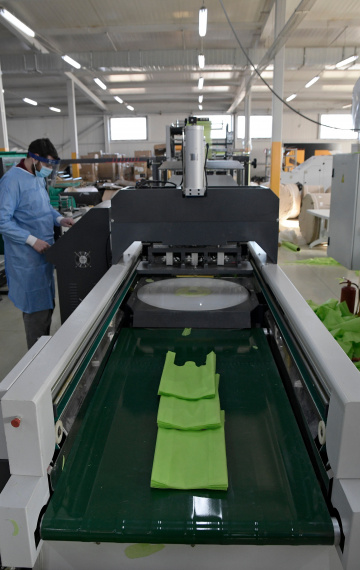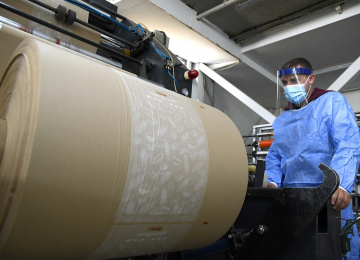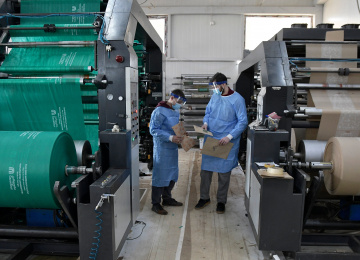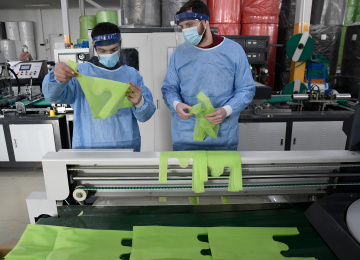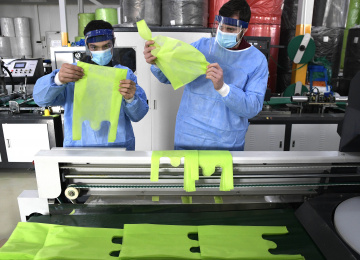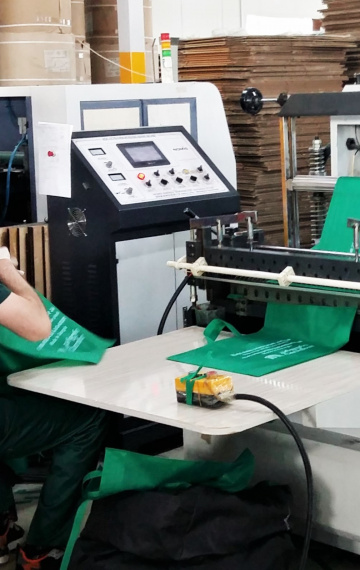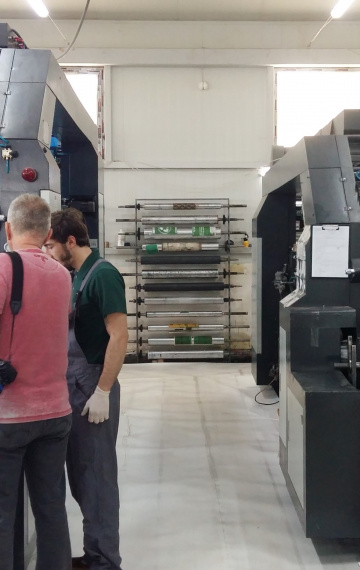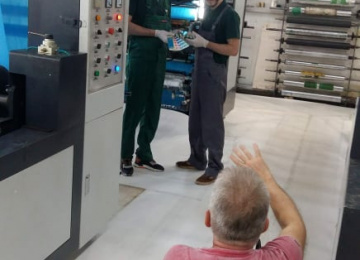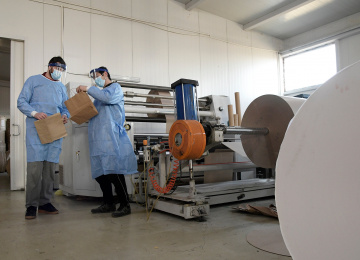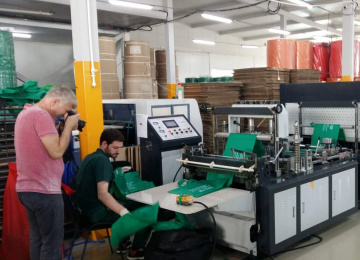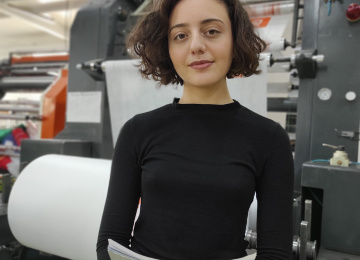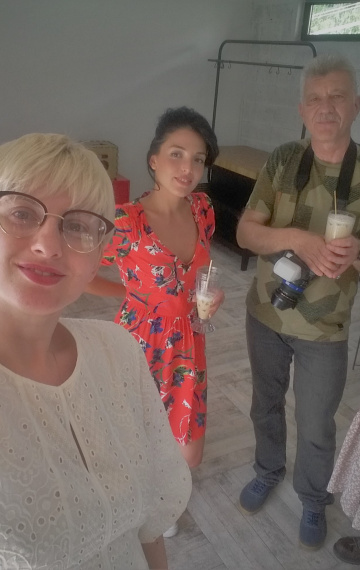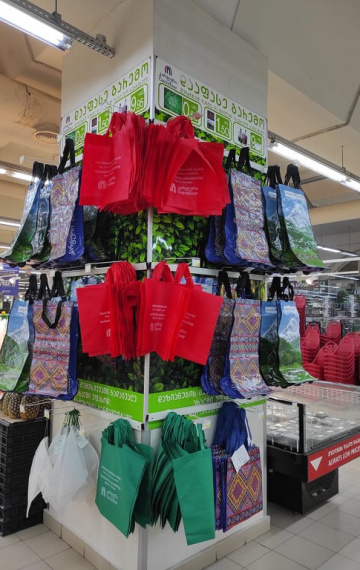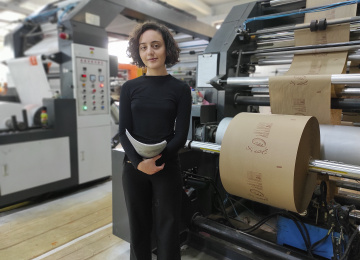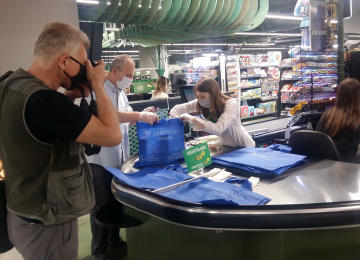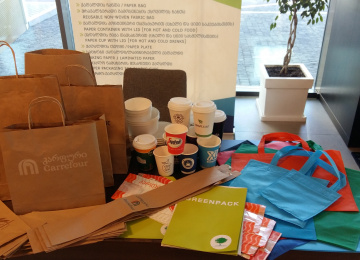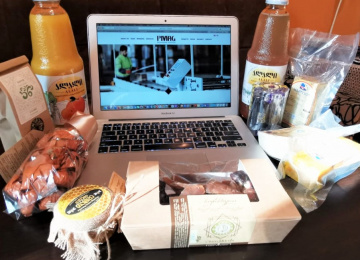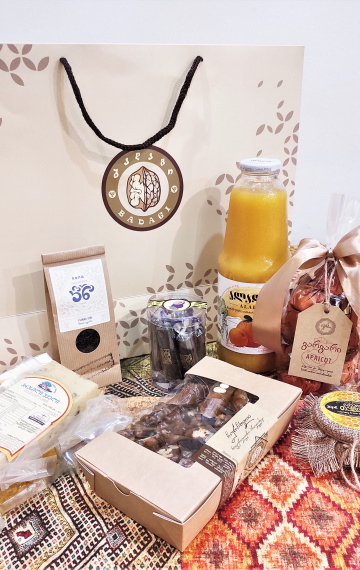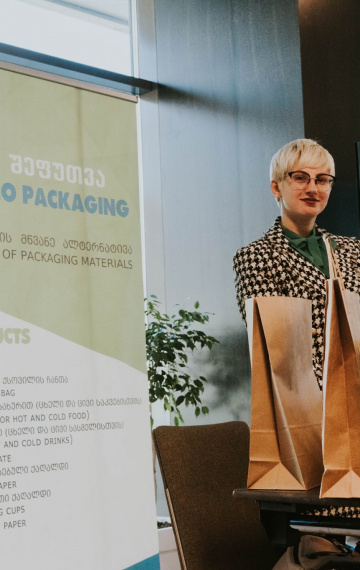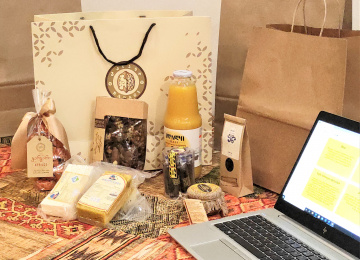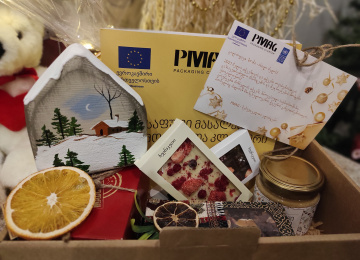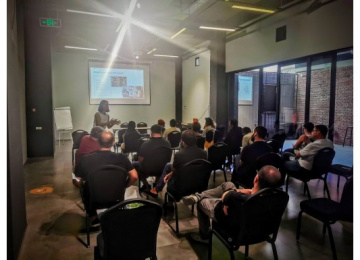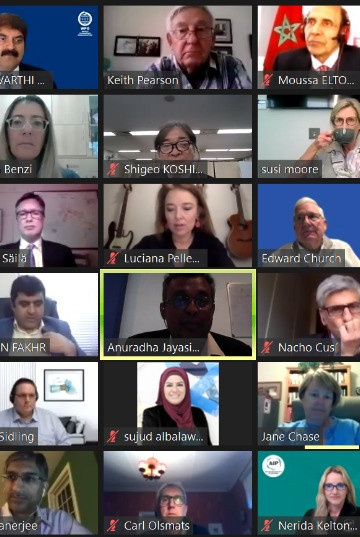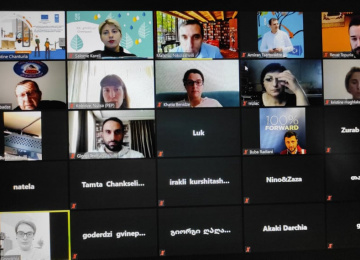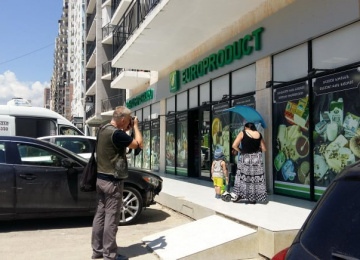
One day, the founders of GreenPack saw a khachapuri — Georgian cheese pie — being reheated and packed in a polyethylene bag for a little boy. ”At that moment, we suddenly thought about how we’ve all got used to harming ourselves, and then the environment, and how a product wrapped in 5 or 6 pieces of plastic has become a common feature. However, we all know, that the most harmful of all is heated polyethylene, whose poisonous chemicals are transferred directly to the food it wraps.”
It was clear to them that there needed to be an alternative to packaging materials that would, first of all, be safe for children and human health and that would not be harmful to the environment. GreenPack is the first company in Georgia to start making eco-friendly packaging. First it produced paper bags for bread, and then in 2014, with an Enterprise in Georgia grant, the company was able to transform itself and produce a wide range of packaging materials using biodegradable and environmentally friendly raw materials.
Today, GreenPack produces paper packs for baked goods, disposable paper tableware, and regular paper bags. Since 2019, it’s begun making an innovative product for Georgia — reusable shopping bags. GreenPack supplies the country’s largest retailers, but it also has a special affordable line of products for start-ups. A recent customer satisfaction survey, showed that GreenPack’s customers especially like the fact that the company cares for their health and the environment, that its products are affordable, are durable, and can be reused multiple times. For the founders, this is literally the best reward: reaching their goal to change mindsets and lifestyles, and to replace harmful plastics with eco-friendly packaging. Over time, more and more shoppers are coming to Georgia’s supermarkets with the bags they’ve brought from home.
The combination of a noble idea and doing business is always a challenge, and sometimes it seems that these challenges grow harder at every step. However, since companies operating in the same sector are likely to face similar challenges, it might be easier to find solutions together. With this in mind, GreenPack decided to set up the Packaging Association, together with partner organizations. With support from the EU as part of its EU4Business Initiative and UNDP Joint Initiative for Private Sector Competitiveness in Georgia, the Association took on the role of a cluster management organization, (PMAG Packaging Cluster) significantly widening its scope and coverage. This made it possible not only to establish cooperation with packaging makers, but also to work with upstream, downstream and supporting industries, broadening the packaging value chain.
International experience
Within this project, GreenPack was offered the opportunity to meet similar packaging companies in Hungary. Managers visited several companies and learned about advanced technologies in packaging that handled issues GreenPack had struggled to solve before, especially the separation of waste and ecofriendly materials to make separation easier.
But what was most important during these visits for GreenPack was that its people realized that their enterprise had similar equipment and resources to their Hungarian counterparts, which made it clear that by improving technologies, exporting to the EU was even easier than they might have imagined. In this respect, GreenPack has started to work and plan going through the standardization process in a short period of time.
Internship Programs
One of the main criteria for standardization is optimizing production processes, especially the correct structural distribution of duties and functions in the company. „As part of this project and Cluster Development, an internship program was set up, and the cluster’s educational institutions offered their students to do internships in our enterprises. Internship fees were covered by the cluster through project support.“
GreenPack was also involved in this process and recruited a student as an administrative assistant for three months. This process was beneficial for both sides: on one hand, it was the first job for the intern and GreenPack did its best to transfer and teach her skills that would be useful in the future; on the other, it appeared that organizational structure could be streamlined and company management clearly saw this.
Capacity Building
The cluster initiative analyzed GreenPack’s needs to develop the capacity of its employees, and shortly afterwards, a capacity development program was launched. So far, this has covered incentivising sales, empowering management, project management, communication, and marketing. What pleased GreenPack most were the qualifications of the instructors and content of the modules: planning is one thing, but everything depends on execution. GreenPack is confident that the company will get practical information from the best specialists in this field. While measuring results in advance is difficult, the program is still going on, raising the competence of GreenPack employees as one of the most important processes in the company’s development. Management’s expectations are very positive.
Digitalization
GreenPack’s management considers quality digitalization of the greatest importance today in order for marketing to be truly effective. They took advantage of the opportunity offered by the program to digitize sales.
First of all, the project supported the development of a digital catalogue of cluster members. Beyond that, GreenPack had the opportunity to get situational or advertising content for additional sales channels, which it actively used in all social media and print advertising materials. This initiative enabled the company to save time, logistics and expenses.
E-commerce
This was yet another important cluster initiative supported by the project. Digitalizing commerce means developing packaging e-commerce, an e-space for the entire packaging sector in Georgia, making easier to deliver packaging solutions to improve the competitiveness of Georgian products locally and, even more importantly, abroad.
Based on its own example, GreenPack management can say that greater expectations are placed on e-commerce, since they have to deal with customers with a small number of orders. Conventional sales techniques are ineffective in delivering the product to such customers: with e-commerce, these problems can be solved. This is especially important with a pandemic raging, and so a new, fully digitalized form of sales has had to be established.
The initiative will also facilitate the development of entrepreneurship in general, as SMEs will have easy access to modern solutions for packaging their products, provided in one space, which is crucial for strengthening local production and export.
Sharing global experience
The main purpose of the cluster is probably to connect the right companies with each other to share knowledge and experiences. The positive aspect here is that clusters bring companies of different size and experience together. GreenPack says that they often make use of their contacts and knowing those firms leads to good results. For example, earlier this year, they started negotiations with Azerbaijan to export their packaging products—negotiations that were successful. But, since they were sending their product to this country for the first time, they needed to clarify the process and the documentation involved.
So, first GreenPack started to sort out the official documents. In this situation, the most valuable help that can be given to a company is the experience of a peer who has already gone through the process. GreenPack took the opportunity to take advantage of this kind of experience through the cluster platform and was given very simple, useful and accurate advice, by packaging company CaucasPack, allowing it to deal with the red tape quite easily. Based on that, GreenPack was able to sign a contract to export reusable eco-friendly bags and biodegradable paper packaging to Azerbaijan. This kind of “internationalization” has made GreenPack’s management consider additional expansion, bringing additional value to GreenPack itself, more jobs, eco-friendly packaging for the region, and less environmental pollution.
This is the beginning of a new phase for GreenPack, which is becoming a regional player in eco-packaging—one the company is sure will be full of new opportunities and challenges.
In cooperation with the cluster management organization and members, it will be much easier to generate opportunities and respond to challenges. The cluster has joined the World Packaging Organization, which offers easier access to modern technologies and know-how. The project itself has strengthened the cluster in this regard and launched a grant scheme to promote cooperation among firms for strategic investments to finance expansion, support cooperation and efforts to grow business, generate jobs, implement quality control schemes and innovations, reduce the impact on the environment, and improve overall competitiveness.
GreenPack plans to participate in this initiative. Such examples exemplify the effectiveness of the cluster as a cooperative platform, unleashing the potential of SMEs to address challenges and take advantage of opportunities. The company looks forward to the next developments in the cluster, which has already been accredited by the European Cluster Excellence Initiative (EICI) BRONZE Label “Striving for Cluster Excellence,” making it the only cluster with this honor in Georgia.

